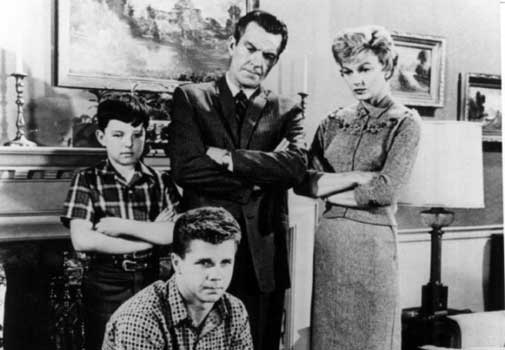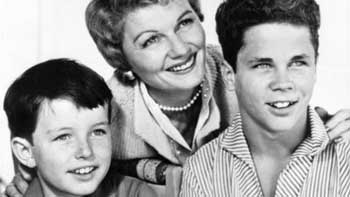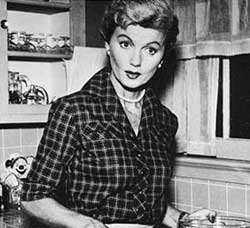
It's neither cool nor civilized to criticize someone who has recently died, and that's not the purpose of this effort. But the death Saturday of Barbara Billingsley, at age 94, brought to mind all the criticism and parody the moms of the Golden Age of Television attracted as the world slowly enlightened to the role of women as people versus patterns. And thinking that her death might resurrect some of that criticism, it's a good time to go on record with a hearty Balderdash to counter those thoughts.

It's old news that Ms. Billingsley's June Cleaver on Leave It to Beaver, as well as Harriet Nelson's Ozzie and Harriet TV role and Jane Wyatt's Margaret Anderson on Father Knows Best, were among actresses who took plenty of shots for playing roles that implied a standard for wives and mothers that could exist only in a script. I feel bad for women who tried to hit that standard, and for husbands and children who suspected they'd mistakenly gotten on the wrong bus.
But the truth is, I never saw any evidence of the Perfect Mom Complex in real life. I grew up with these shows as regulars in our home. My mother, like the mothers of all my friends, never seemed a bit rattled, and surely not intimidated, by June Cleaver and company.
No moms wore pearls or always had fresh-baked cookies for me and my friends. (We would have been embarrassed by the former and we totally would have exploited the latter.) They didn't seem ashamed to wash the kitchen floor, give themselves a home permanent or ask the family to try the new casserole recipe that didn't turn out perfectly -- all situations rarely dramatized on Golden Age sitcoms. Trauma, in our neighborhood, was a sidewalk that didn't get shoveled quickly enough after a snowfall, or garbage cans that remained at the curb too long after pickup.
I never saw any of the dads in our neighborhood hang out in the house wearing a tie and a sport coat. And though there was nothing wrong with smoking then, I never saw a dad walk around with a lighted pipe in his mouth. There might have been a couple of David Nelsons or Wally Cleavers in our neighborhood, but those of us who weren't as shallow as Eddie Haskell kind of wished we could be.

All of us -- moms, dads, boys and girls -- knew the Nelsons and the Cleavers and the Andersons were no more real than Blondie, Dagwood or Snoopy. We watched and liked these series (until Rick Nelson ended up taking over the last segment of that sitcom with record-promoting performances) the same way we now read magazines in waiting rooms -- it was an amusing way to pass the time. We didn't take them very seriously, just as we didn't expect Michael Anthony to deliver us a tax-free million-dollar check from John Beresford Tipton (Google it, youngsters).
Just as, today, we don't think our next home purchase will land us in the middle of some Desperate Housewives.
My mother, my sister and my wife never said bad things about June Cleaver et. al. They never lamented how their lives were irrevocably changed for the worse by TV mothers who never had to unclog a toilet or scrape an eighth of an inch of burned surface off the cake that stayed in the oven too long.
Maybe it was because we all started our lives before the phenomenon of television brought fictional domestic situations into the home. But it probably didn't inflict the alleged damage because I believe our brains are deep-wired to reject the outrageous -- outside of politics, that is.
Barbara Billingsley's character is a memorable one for a lot of good reasons. Decades from now, will someone be able to say that about the mother in Raising Hope? Doubt it.
Thanks, Mrs. Cleaver.